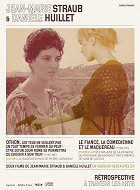Othon
-
Die Augen wollen sich nicht zu jeder Zeit schließen oder Vielleicht eines Tages wird Rom sich erlauben seinerseits zu wählen (több)
Tartalmak(1)
Based on a play by Pierre Corneille, Straub & Huillet’s film is about Othon, who must forsake his bride and marry the niece of the current ruler in order to become emperor. The story is narrated by way of largely static arrangements of one, two or three people before scenes of present-day Rome, complete with traffic noise. Eschewing conventional intonation, the dialogues become a torrent which sweeps details away, even as the theme of the individual and society still remains apparent at its core. Les Yeux ne veulent pas en tout temps se fermer ou Peut-être qu’un jour Rome se permettra de choisir à son tour (Othon) is a film of discrepancies which are negotiated between screen and audience in aesthetic terms: between seeing and understanding, between past and present, theatre and cinema, politics and feelings. (Berlinale)
(több)Recenziók (1)
(The entire original title of the film is Eyes Do Not Want to Close at All Times, or, Perhaps One Day Rome Will Allow Herself to Choose in Her Turn). It could be argued that the film is uncinematic in its conception - indeed, the main impression from watching it is the author's "pleasure from the text." Straub and Huillet adhered faithfully to the original baroque text twice: the originality in the language used (French) is supported by the originality of the space, which is being referred to and which is the setting - Rome. In this, the talent (or rather originality...) of the directing duo is shown, namely that they break this historically faithful originality with the intruder of the modern world, which simultaneously forms the background for the depicted story and a possible symbolic center to which the viewer may or may not relate this inquiry into the mechanisms of politics and emotions. But the film is not all that uncinematic: mostly the static camera, focused on tracing the minimalist expression of the actors and facilitating the perception of the dramatic language, occasionally conjures up a magical composition, or the directors rarely resort to a camera movement; however, the viewer thus takes that much more pleasure in them.
()
Galéria (1)
Photo © Capricci Films

